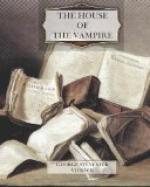“It is extraordinary,” murmured Reginald. “I had not dreamed of it.”
“So you do not think it rather fantastic?” remarked Ernest, circumscribing his true meaning.
“No, it is quite possible. Perhaps his Narcissus was engaging the sub-conscious strata of my mind while I was writing this passage. And surely it would be strange if the undercurrents of our mind were not reflected in our style.”
“Do you mean, then, that a subtle psychologist ought to be able to read beneath and between our lines, not only what we express, but also what we leave unexpressed?”
“Undoubtedly.”
“Even if, while we are writing, we are unconscious of our state of mind? That would open a new field to psychology.”
“Only to those that have the key, that can read the hidden symbols. It is to me a matter-of-course that every mind-movement below or above the threshold of consciousness must, of a necessity, leave its imprint faintly or clearly, as the case may be, upon our activities.”
“This may explain why books that seem intolerably dull to the majority, delight the hearts of the few,” Ernest interjected.
“Yes, to the few that possess the key. I distinctly remember how an uncle of mine once laid down a discussion on higher mathematics and blushed fearfully when his innocent wife looked over his shoulder. The man who had written it was a roue.”
“Then the seemingly most harmless books may secretly possess the power of scattering in young minds the seed of corruption,” Walkham remarked.
“If they happen to understand,” Clarke observed thoughtfully. “I can very well conceive of a lecherous text-book of the calculus, or of a reporter’s story of a picnic in which burnt, under the surface, undiscoverable, save to the initiate, the tragic passion of Tristram and Iseult.”
VI
Several weeks had elapsed since the conversation in Reginald Clarke’s studio. The spring was now well advanced and had sprinkled the meadows with flowers, and the bookshelves of the reviewers with fiction. The latter Ernest turned to good account, but from the flowers no poem blossomed forth. In writing about other men’s books, he almost forgot that the springtide had brought to him no bouquet of song. Only now and then, like a rippling of water, disquietude troubled his soul.
The strange personality of the master of the house had enveloped the lad’s thoughts with an impenetrable maze. The day before Jack had come on a flying visit from Harvard, but even he was unable to free Ernest’s soul from the obsession of Reginald Clarke.
Ernest was lazily stretching himself on a couch, waving the smoke of his cigarette to Reginald, who was writing at his desk.
“Your friend Jack is delightful,” Reginald remarked, looking up from his papers. “And his ebon-coloured hair contrasts prettily with the gold in yours. I should imagine that you are temperamental antipodes.”




